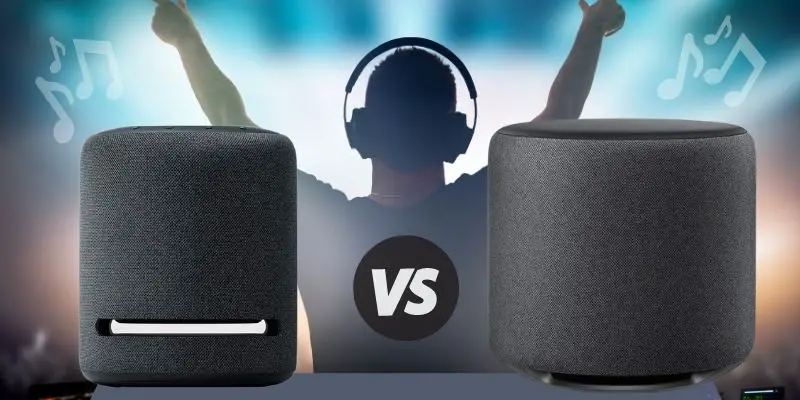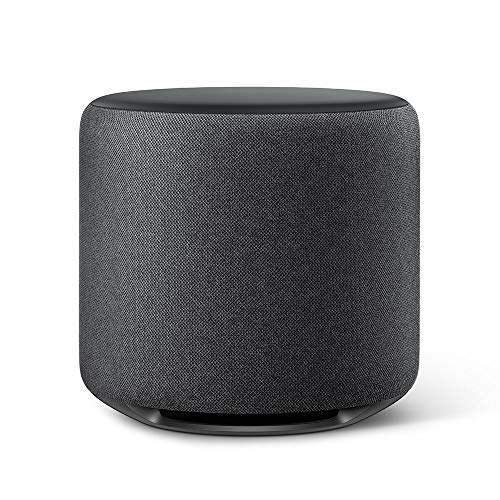As an Amazon affiliate, I earn from qualifying purchases.
In this post, I explore the Echo Studio vs Echo Sub, two premium speakers from Amazon’s lineup. We’lI delve into their unique features, design, audio quality, Alexa support, setup, and more.
The Best of Amazon Audio
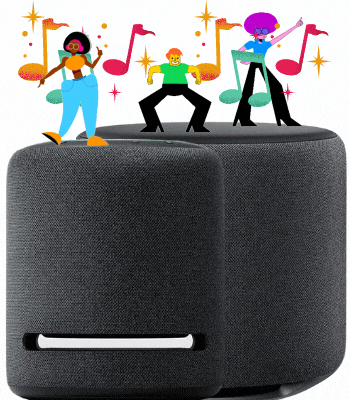 On Amazon Prime Day, I couldn’t resist adding a third Echo Studio and a second Echo Sub to my growing collection of Alexa speakers.
On Amazon Prime Day, I couldn’t resist adding a third Echo Studio and a second Echo Sub to my growing collection of Alexa speakers.
With the latest iterations of these devices now enhancing my home, it’s an ideal time to clear up some common misconceptions about the Echo Studio vs Echo Sub. But what are the main differences?
The Echo Studio features Dolby Atmos, a 1″ tweeter, three 2″ midrange speakers, and a 5.25″ woofer, offering rich sound. The Echo Sub, a bass-only subwoofer, must be paired with another Echo. It has a 100W Class D amplifier and a 6″ woofer, yet lacks Alexa.
I’m thrilled with these speakers. They’re a part of my daily life, enriching my multi-room music setup with Amazon Music, Pandora, and Apple Music.
Now, let’s dive into the finer details of Echo Studio vs Echo Sub.
Echo Studio vs Echo Sub: Tech Specs Comparison
Following is a side-by-side comparison showcasing the major similarities and differences between the Echo Studio vs Echo Sub.
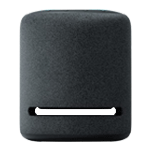
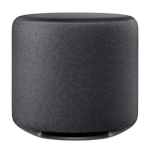


Last update on 04/16/2025 / Affiliate links / Images from Amazon Product Advertising API
Amazon Echo Studio Mini Review
Amazon originally produced the Echo Studio to rival Apple’s discontinued-but-now-recontinued HomePod, delivering a bigger, better sound, more advanced sound optimization, and a truly “smart” device. It is the best-sounding Echo speaker, in my opinion. Its tweeter, mid-range speakers, and 5.25-inch downward-firing woofer deliver amazing sound.
Last year, Amazon recently announced a nice design and software upgrade to the Echo Studio, which I promptly purchased. While there are no hardware updates, there is a new color choice and a software update to Amazon’s premium-sounding spatial audio format. The new Glacier White model (pictured above) is now available at Amazon (link below).
You can also still get the original Charcoal color one, and all Echo Studio owners will receive the software update when Amazon releases it.
The Dolby Atmos-compatible directional audio makes the Echo Studio sound like a much larger speaker, with higher-than-average volume for its size and a superb sound balance. It’s also programmed to analyze the acoustics of whatever room it’s in and adjust the audio filters to optimize sound output.
Listening to grand, sweeping songs like Radiohead’s Fake Plastic Trees and Bruce Springsteen’s Terry’s Song shows off the Echo Studio’s above-average directionality, layered sound, and surprising subwoofer power for such a small device.
Pros
Cons
Video Review
Video Credit: Tec TimmyWhere to Buy It
Amazon Echo Sub Mini Review
Amazon’s Echo Sub is ideal for enhancing bass with Alexa-enabled devices. It’s a 6” downward-firing subwoofer that pairs with Echo devices like the Echo Studio, enhancing lows and deep tones in music.
Experience the depth in jazz or the intensity of EDM with the Sub’s thumping, pulsating bass.
The Echo Sub lacks built-in smart capabilities. It must connect to an Echo device for Alexa functionality and focuses on delivering crystal-clear bass, rather than a broad sound field.
Pros
Cons
Compatibility
Echo Sub does not work without a compatible Echo device. It must be paired with one of the following:
Video Review
Craig over at Craig’s Tech Talk does a great job putting Echo Sub through the paces in this video review.
Where to Buy It
Echo Studio vs Echo Sub: Feature Analysis
Design
When comparing the Echo Studio vs Echo Sub physically, the Echo Studio stands out with its taller and thicker design compared to the classic Echo and Echo Plus. Its fabric grille and distinct curved shape are hallmarks of the Amazon Echo brand.
Atop the Echo Studio, you’ll find a far-field microphone array and buttons for volume, microphone muting, and activating Alexa. The recognizable LED light ring sits within a plastic ring. Both the Studio and Sub excel in bass range and sound quality, but only the Studio is equipped with Amazon’s Alexa.
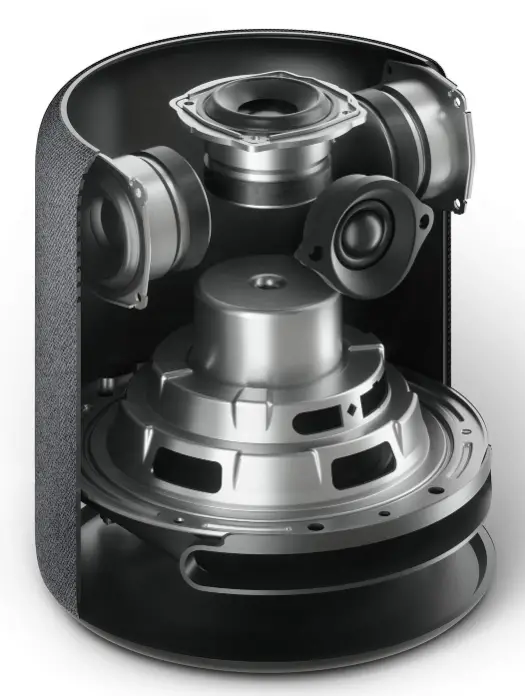
Image Credit: Amazon
The Echo Studio’s body features front and back cutouts for bass ports, optimizing airflow. It delivers robust bass alone or paired with the Sub. Its rear hosts a power port and a 3.5mm optical/aux port.
Here is what my Echo Studio looks like on the table lamp beside my bed.
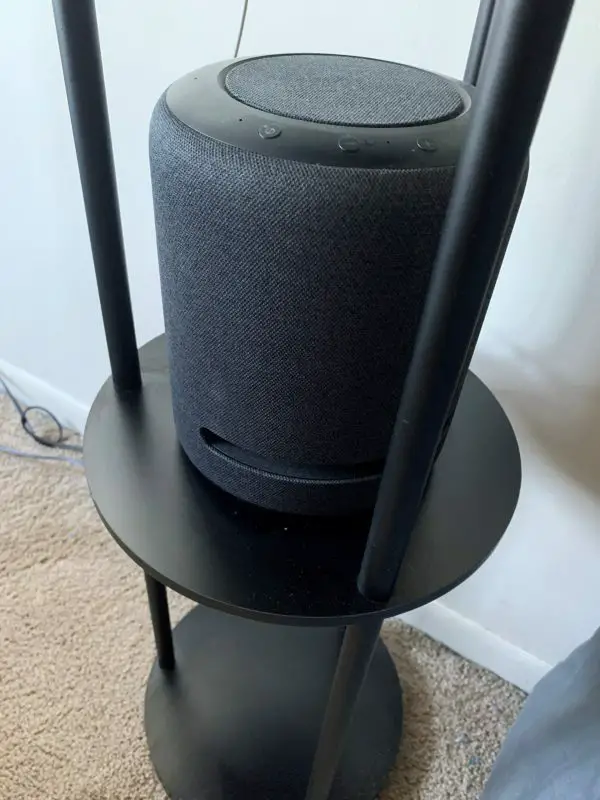
My Echo Studio
The Echo Sub’s compact size (8.0” x 8.3”) belies its powerful 6” downward-facing subwoofer. When comparing Echo Studio vs Echo Sub, the Sub is slightly shorter and thicker (also heavier) than the Studio, featuring Amazon’s classic fabric grille and curved design.
📚 Related: Echo Studio vs Echo Plus
Unlike other Echo devices, the Echo Sub comes only in black and lacks the top-mounted buttons and Alexa light ring – understandable as it doesn’t have Alexa. Its base includes a power connector and a pairing button.
Here’s my Echo Sub in my home office.
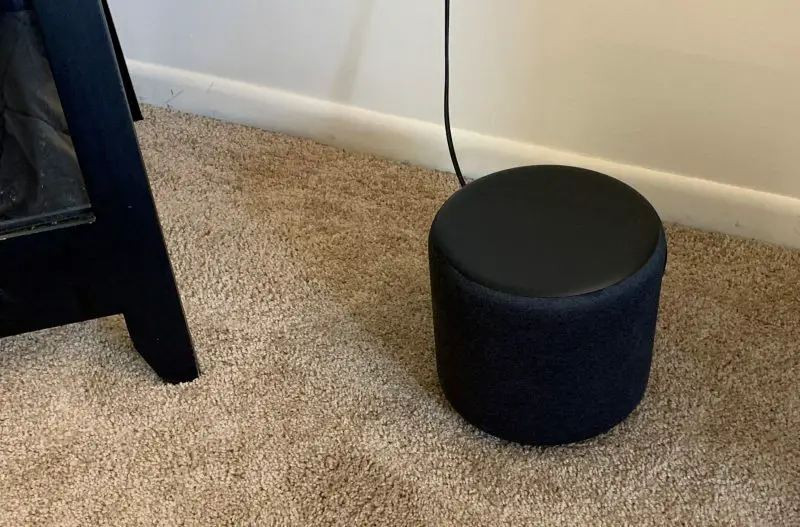
My Echo Sub
Audio Quality
The audio battle of Echo Studio vs Echo Sub centers on creating a three-dimensional sound field akin to surround sound. Optimal when paired with other Studios, Echos, or Echo Subs, the Studio’s diverse drivers deliver a surprisingly vast and precise sound.
Though not matching top-tier soundbars, it offers best-in-class audio for its size.
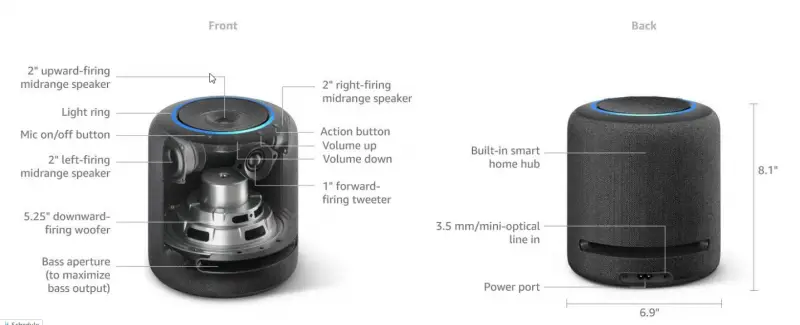
Image Credit: Amazon
Focusing solely on bass, the Echo Sub outperforms the Echo Studio. It addresses the typical lower-range limitations of Echo speakers. Alone, it can enliven a party with driving beats, but paired with Echo devices, especially the Studio, it achieves powerful surround sound.
📚 Related: Amazon Echo vs Echo Plus
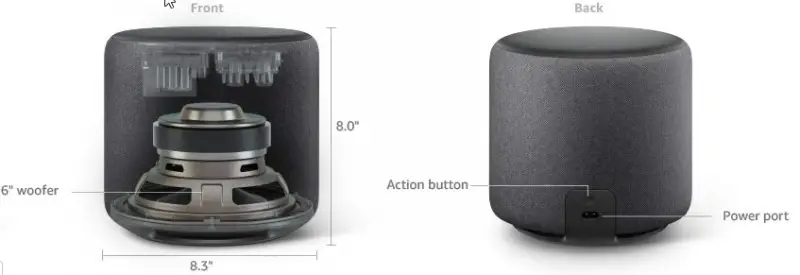
Image Credit: Amazon
Alexa Support
Echo Studio vs Echo Sub in Alexa support: Echo Studio has built-in Alexa, while Echo Sub does not.
With Echo Studio, access all standard Echo features like weather updates, smart home control, music streaming from services like Amazon Music, Apple Music, Pandora, Spotify, and iHeartRadio, podcasts, audiobooks, alarms, internet searches, and more. Pairing Echo Sub with a compatible Echo device enhances these experiences with richer bass.
Setup
Setting up Echo Studio is as straightforward as any new Echo. Alexa will automatically add it to the Alexa app on boot up. You just need to make sure it is connected to Wi-Fi, set the device location, and link to your music streaming service.
Once configured, its Alexa capabilities match those of Echo, making it a superb addition to your smart home.
My Echo Studio instantly synced with my Alexa app for voice commands upon powering up. I added it to my multi-room music group later. For setup tips, see my guide on Fixing Alexa Multi-Room Music.
Echo Sub setup is even more simple, requiring pairing with an Alexa-enabled device like Echo, Echo Plus, Echo Show, or Echo Studio. I paired mine with Echo Show 8, as shown in the Alexa app:
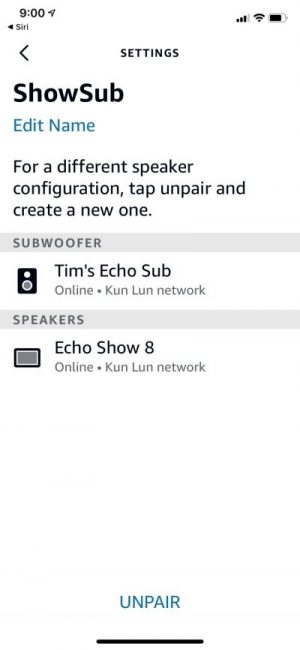
The Echo Sub is one of the easiest Echo devices to set up. Unbox, power up, and use the Alexa app to link it to your main Echo device. It’s designed to complement an existing sound system, not as a standalone speaker. The Alexa app includes specific settings to connect compatible Echos with the Sub, offering seamless plug-n-play.
📚 Related: 17 Awesome Echo Devices
What’s In The Box
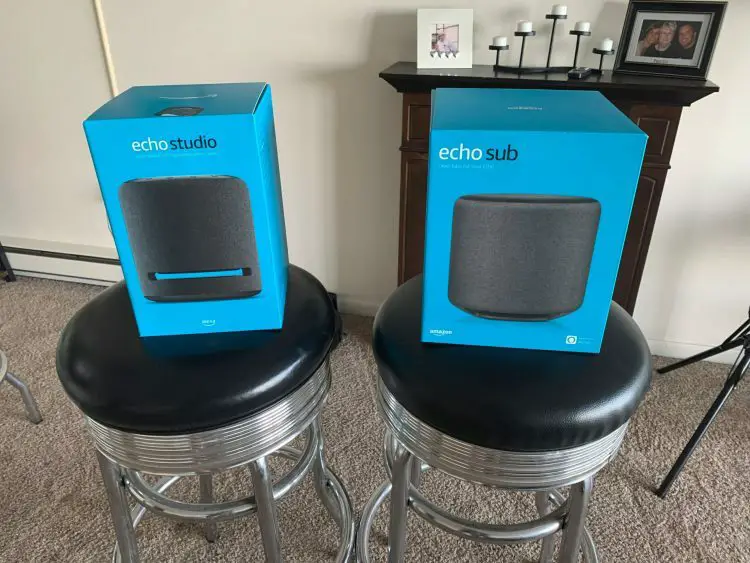
My Echo Studio and Echo Sub Boxes
Here’s a quick rundown of the box contents for the Echo Studio vs Echo Sub speaker.




Last update on 04/16/2025 / Affiliate links / Images from Amazon Product Advertising API
Echo Studio Unboxing Video
Here is the Echo Studio unboxing video I made on my YouTube channel.
Echo Sub Unboxing Video
Here is the Echo Sub unboxing video I published on my YouTube channel.
FAQs
Question 1: What are the key differences between Echo Studio and Echo Sub?
Answer: Echo Studio is a versatile smart speaker with advanced features like Dolby Atmos, ideal for diverse audio experiences. Echo Sub, designed for bass enhancement, pairs well with Echo devices, including Studio. It’s perfect for those seeking richer bass tones, complementing Studio’s range by focusing on lower frequencies, thereby making it an essential addition for deep sound lovers.
Question 2: Can Echo Sub operate independently, or does it need to be paired with Echo devices?
Answer: Echo Sub, not a standalone device, requires pairing with an Echo device, like Echo Studio or other compatible Echo speakers, for functionality. Designed to supplement the Echo ecosystem, it adds powerful bass depth, thereby enhancing the overall audio experience. This makes it an excellent choice for users seeking to intensify their system’s bass.
Question 3: Is Echo Studio or Echo Sub better for first-time Echo device users?
Answer: For first-time Echo users, Echo Studio is the recommended choice, being a complete smart speaker with exceptional sound quality, suitable for a range of uses. The Echo Sub, an add-on device, is ideal for those who already have an Echo setup and are looking to enhance bass, adding depth to their sound.
Question 4: How does adding an Echo Sub enhance an existing Echo Studio setup?
Answer: Adding an Echo Sub to an Echo Studio setup significantly enhances bass performance, creating a fuller, more immersive audio experience. This combination is effective for music genres emphasizing deep bass, enriching sound with richer, more dynamic tones. It’s ideal for those who want to elevate their audio system’s bass quality.
Final Analysis: Echo Studio vs Echo Sub
When comparing Echo Studio vs Echo Sub, we are really comparing apples and oranges. If this is your first Echo speaker, the Echo Studio is a solid choice, delivering excellent sound quality. However, if you already have Echo speakers and prioritize bass, adding the Sub enhances your setup significantly.
Both the Studio and Sub offer great sound, albeit in different ways. The Studio stands out in the Echo lineup for its superior sound quality, while the Sub takes your bass to the next level. They may not be the cheapest, but compared to premium offerings from brands like Bose and Sonos, they are more affordable, especially with deals on Prime Day, Black Friday, and Cyber Monday.
So, what’s your take on the Echo Studio vs Echo Sub? Do you plan to get one or both like me? I now have 3 Echo Studios and am thinking about getting a second Echo Sub!
Anyhow, I would love to hear if you plan on buying one or both of these speakers. Please leave a comment below and let me know. Until next time, jam on!
📚 Related: Echo vs Sonos vs Bose Sub

Tim Brennan, a tech blogger and host of the @TecTimmy YouTube channel, writes about smart homes at oneSmartcrib, home theaters at UniversalRemoteReviews, and AI in writing at Writeinteractive. He holds a Journalism degree from Northeastern University and has covered technology for three decades. He lives on the ocean in Nahant, Massachusetts.
Please subscribe to my YouTube channel for a fun take on all things tech.

